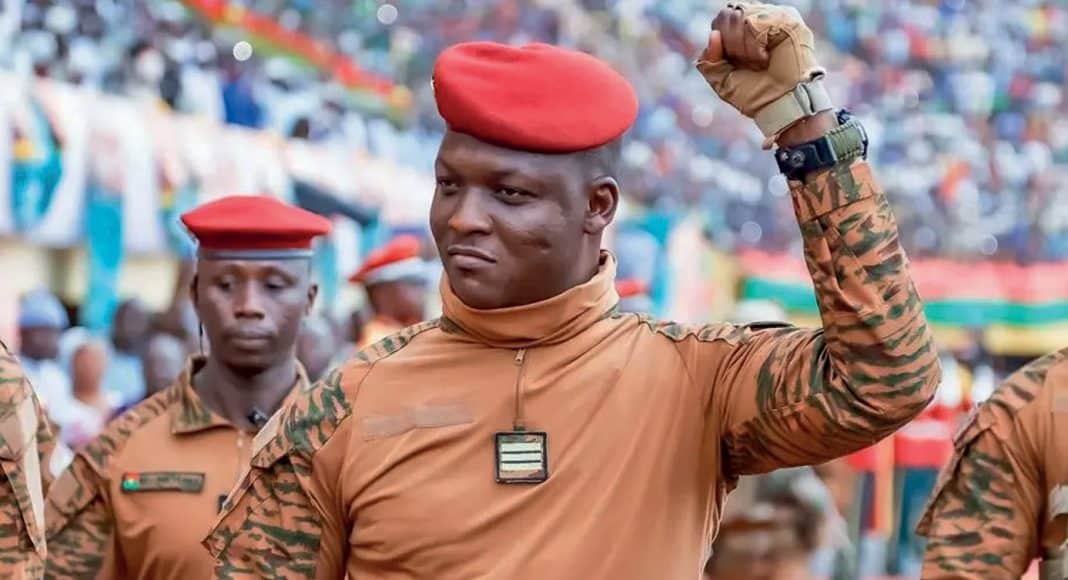In April 2025, another imperialist-backed coup and assassination attempt against Burkina Faso’s President Ibrahim Traoré was foiled. Protests subsequently erupted around the world in support of Traoré and the Alliance of Sahel States (AES) calling for ‘hands off Africa’. The successes of the AES – an anti-imperialist federation in West Africa consisting of Burkina Faso, Mali and Niger – has drawn the ire of US imperialism, which seeks to diminish the growing influence of its rivals in the Sahel by undermining the sovereignty of the AES. Cassius J Kalany reports.
US imperialism rears its ugly head
Since coming to power in September 2022, Traoré has survived a confirmed seven coup attempts, mostly plotted by French imperialism trying to regain control of its former colony. However, the evidence points to US imperialism being behind the most recent attempt.
On 21 April, Burkinabé Minister of Security Mahamadou Sana revealed that the coup attempt planned for 16 April had been foiled. It involved a series of conspirators based in Abidjan, Ivory Coast. The United States Africa Command (AFRICOM) commander General Michael Langley met with Ivory Coast’s Minister of Defence, Tene Birahima Ouattara, eight days after the planned coup attempt on 24 April, fuelling suspicion of collaboration. AFRICOM is the section of the US Department of Defence that is responsible for leading US military intervention on the African continent. It views Ivory Coast as an important partner in countering Russian and Chinese influence in West Africa. Langley and Ivorian President Alassane Ouattara have met multiple times this year and are planning to build a US drone base in Ivory Coast. At the same time, Ivory Coast still maintains good relations with France despite expelling French troops. Traoré has previously accused the Ivory Coast of harbouring ‘all the destabilisers’ of his country.
In response to imperialist aggression, local Burkinabé grassroots groups called for a global day of action on 30 April. Protests outside US embassies swept across Africa, North America and Europe, including London. President Ibrahim Traoré expressed his gratitude, thanking the ‘patriots and pan-Africanists’ who mobilised. On 28 May, during an AFRICOM defence conference in Kenya, Langley cynically remarked that Burkina Faso ‘remains vulnerable’. This vulnerability is due to increased terror attacks from ISIS and Al-Qaeda-linked insurgents in the region. Jihadist insurgents in the Sahel are supported, trained and supplied by NATO through Ukraine (see FRFI 302: ‘Imperialist hands off the AES’). In a recent interview, Traoré explained that ‘It’s not really terrorism, it’s imperialism’, remarking on the foreign financial assistance and presence of foreign mercenaries and criminals alike, which support reactionary movements.
AES: a growing threat to imperialism
AFRICOM was established in 2007 with an explicit goal of ‘expanding partnerships and interests in Africa.’ It has military bases covering 60% of African nations and is the bastion for US imperialist intervention in Africa. It helped topple Muammar Gaddafi’s government in Libya in 2011, leading to the Sahel becoming the global hotbed for terrorism. When questioned on the purpose of US presence in Africa in March, Langley replied ‘for access and influence’ across the Maghreb, which is ‘NATO’s southern flank’ and where Russia and China benefit from mining concessions. The AES has kicked out both French and US troops, started nationalising industry (especially in the mining sector) and cracked down on foreign multinational mining companies. Following national consultations in February and April 2025, Niger’s Abdourahamane Tchiani and Mali’s Assimi Goita were sworn in officially as presidents of their respective countries for five-year renewable terms. US imperialism is losing its foothold in the region and will be forced to pay costlier sums for the mineral wealth of these countries.
Burkina Faso is viewed as the most immediate threat due to its young, charismatic and outspoken president who constantly draws comparisons with national hero and former socialist leader Thomas Sankara. Sankara took power in 1983 in his early thirties and for four years drove forward radical reforms in housing, healthcare, agriculture and education, championing self-reliance and national sovereignty and rejecting Western aid. After his assassination in 1987, the gains of the revolution were overturned by President Blaise Compaoré, who now lives in exile in Ivory Coast after being overthrown by the 2014 Burkina Faso Revolution. Traoré sees himself as a disciple of Sankara, using the increased revenue from mining to invest in key social infrastructure to fight underdevelopment and to bolster the army’s military as it continues to reclaim national territory from insurgents. Traoré’s pan-africanist and anti-imperialist position has resonated throughout all of Africa, and now neighbouring countries such as Ghana and Guinea are consolidating their control over mining resources from foreign multinationals. The US fears Traoré because his message of sovereignty and self-determination could continue to spread and encourage the African masses to close their doors to foreign domination and instead build new partnerships.
Building new alliances
Traoré attended celebrations on 9 May in Moscow of the 80th Anniversary of the Soviet Union’s victory over Nazism. He met with Russian President Putin, expressing his desire to strengthen cooperation between the two countries. China, also in attendance, offered zero tariffs on all imports from Burkina Faso. On 30 April, Iran and Niger signed a new cooperation agreement, covering mining, energy, industry and technology transfer.
During the trip, Traoré also met with President Nicolas Maduro of the Bolivarian Republic of Venezuela for the first time. Maduro stated, ‘We are brothers and sisters of the same mother, which is Africa, and today we have started a new path together.’ Cuban Foreign Minister Bruno Rodriguez Parrilla visited Burkina Faso in March, commemorating 50 years of cooperation and looking to strengthen the significant contributions Cuba has made to Burkina Faso’s development in health, education, and agriculture. Burkina Faso’s new partnerships attest to its growing sovereignty and a rejection of the Western ‘rules-based order’, which had left it underdeveloped for so long. It is leading the fight against imperialism in Africa.
à bas l’impérialisme!
Vive l’AES!
FIGHT RACISM! FIGHT IMPERIALISM! 306 June/July 2025




